10 of today‘s brightest guitar talents discuss the everlasting impact of Eddie Van Halen
Yvette Young, Plini, Nita Strauss, Jared James Nichols and more salute the maestro
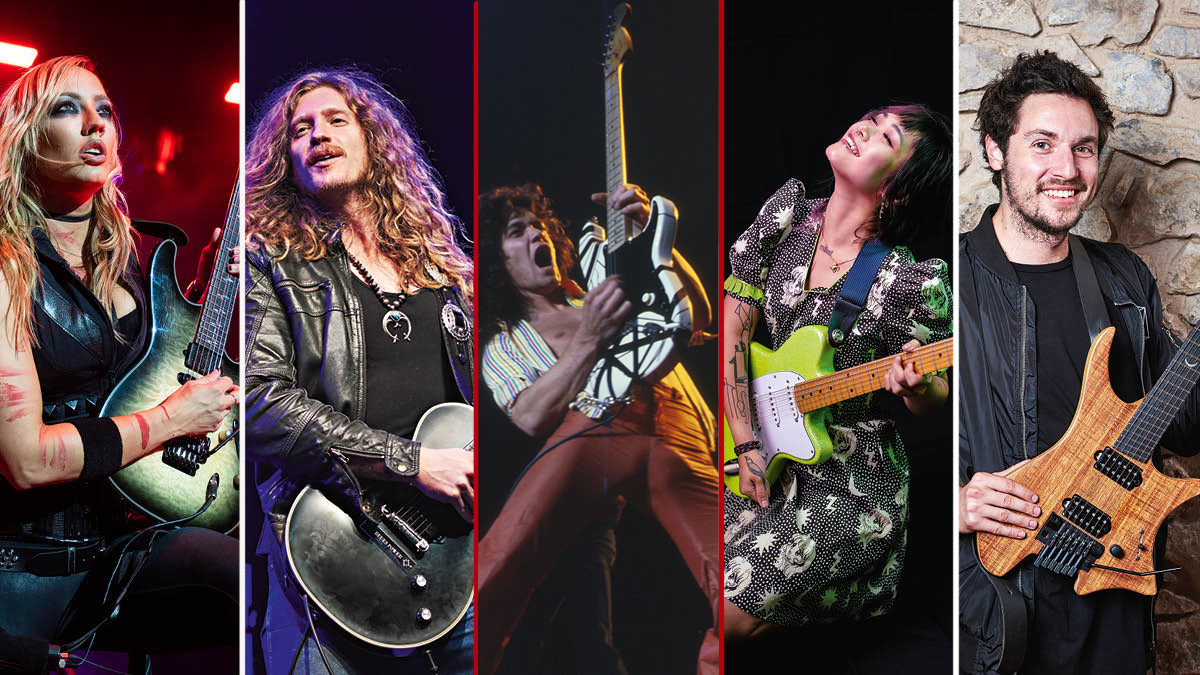
Way back in 1978, with the release of Van Halen’s explosive self-titled debut album, Eddie Van Halen emerged as arguably the most influential rock guitarist since Hendrix.
His genius as a virtuoso, innovator and rule-breaker would inspire countless players across the years, and that influence continues to this day in the wake of Eddie’s death on October 6, 2020.
Here, 10 leading modern players – including Yvette Young, Tyler Bryant and Nita Strauss – reveal what they learned from Eddie.
With EVH, there is so much to inspire. As Nita Strauss says: “He was so innovative in the way he approached everything about the guitar...”
Yvette Young
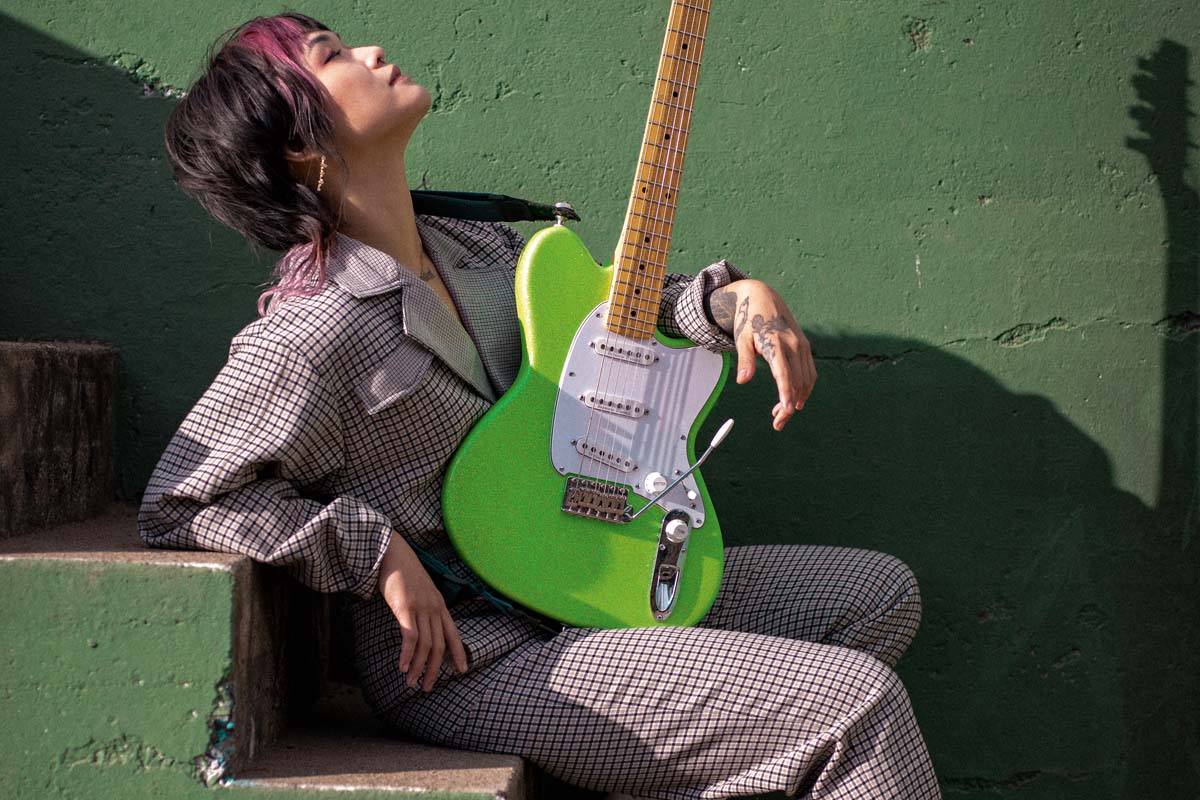
Recent TG cover star Yvette Young is one of the most dazzling guitarists we’ve seen on the rise in recent years. Perhaps what connects her to Eddie Van Halen most is her sheer inventiveness with two-handed approaches, using open strings and altered tunings to bring her creative exploits to life in the most unusual of ways...
How important was EVH’s role in the evolution of guitar playing?
I always loved his attitude towards music. He was exploring the guitar and pushing the boundaries of both genre and instrument out of necessity and compulsion in order to realise what he heard in his head.
Get The Pick Newsletter
All the latest guitar news, interviews, lessons, reviews, deals and more, direct to your inbox!
He definitely expanded upon the vocabulary of guitar and really didn’t pay attention to rules! He did whatever he wanted and wouldn’t think about it too much, and I think that’s what helped push him to not only rethink the way guitar was played, but also even the instrument itself!
As a pianist myself, I can really deeply respect his piano roots and how he found a way to treat guitar like a piano with his two-handed tapping style...
He did what he did because he needed to be himself. He didn’t care too much about what other people thought and that’s why he stood out. Also, as a pianist myself, I can really deeply respect his piano roots and how he found a way to treat guitar like a piano with his two-handed tapping style...
It’s interesting how close the guitar can feel to piano when you explore wide intervals with two-handed techniques...
Oh, for sure! I have mad respect for his piano-based technique but also I love how he could be really spontaneous and at other times really well composed and thought-out. And I admire that kind of versatility on the instrument. Be it jazz, classical, or rock... He could play it all and still put it in his own voice. Finally, his ability to write riffs that you could dance to was very special. I’ve always aspired do that in my own playing and writing as well.
And if you had to pick one favourite EVH piece, what would it be?
Gosh, there are so many bangers! 5150 is a personal favourite of mine because it’s just so climactic and upbeat. That song is just sick riff after riff after riff. But I guess you could say that about a lot of Van Halen songs!
Nita Strauss

Modern shred heroes don’t come much more impressive than Nita Strauss. Over the past decade, she’s played in The Iron Maidens, become a member of Alice Cooper’s band, performed in supergroup Metal Allegiance and released her own fret-burning compositions in the form of 2018’s Controlled Chaos. Here, the world’s first female Ibanez signature artist explains what Eddie meant to her...
What struck you most about EVH’s playing?
He was so innovative in the way he approached everything about the guitar, from technique to tone. I always loved how he made two-handed tapping and whammy tricks feel so seamless in his lines. There are so many things that came from him that most guitarists probably don’t realise. It’s like automatic transmission on a car... These days most people just take it for granted without realising that somebody had to do it first. And more often than not, that person was Eddie.
Which tracks of yours do you think his influence shine through the most on?
I’d say Eddie’s innovations are all over my tracks, certainly those techniques in particular. In fact, I think you’d be hard pressed to find one of my solo songs that doesn’t incorporate all of the things he did, like three note per-string scale runs, tapping and dive-bombs.
I always loved Eddie’s use of hammer-ons and pull-offs with open strings – that’s another thing I find that I use often
He played in a way that just made sense with this rare gift for finding the most economical way to get extremely cool sounds out of the guitar. I always loved Eddie’s use of hammer-ons and pull-offs with open strings – that’s another thing I find that I use often. It’s just such a cool contrast between the hard tap on the fret and then the beautiful ringing sound of the open string. There are a few tracks on my upcoming solo album that will really feature an open string hammer-on melody.
And what would be your personal pick out of the EVH catalogue?
It’s not the most guitar-heavy track in the world, but the song Dreams has always had a really special meaning for me. It was a song that I heard at a really young age and lyrically hit home. I still get emotional when I hear ‘We belong in a world that must be strong, that’s what dreams are made of’. The way the solo gives a nod to the song’s melody before hitting that impeccable tapping is just perfection.
Tyler Bryant
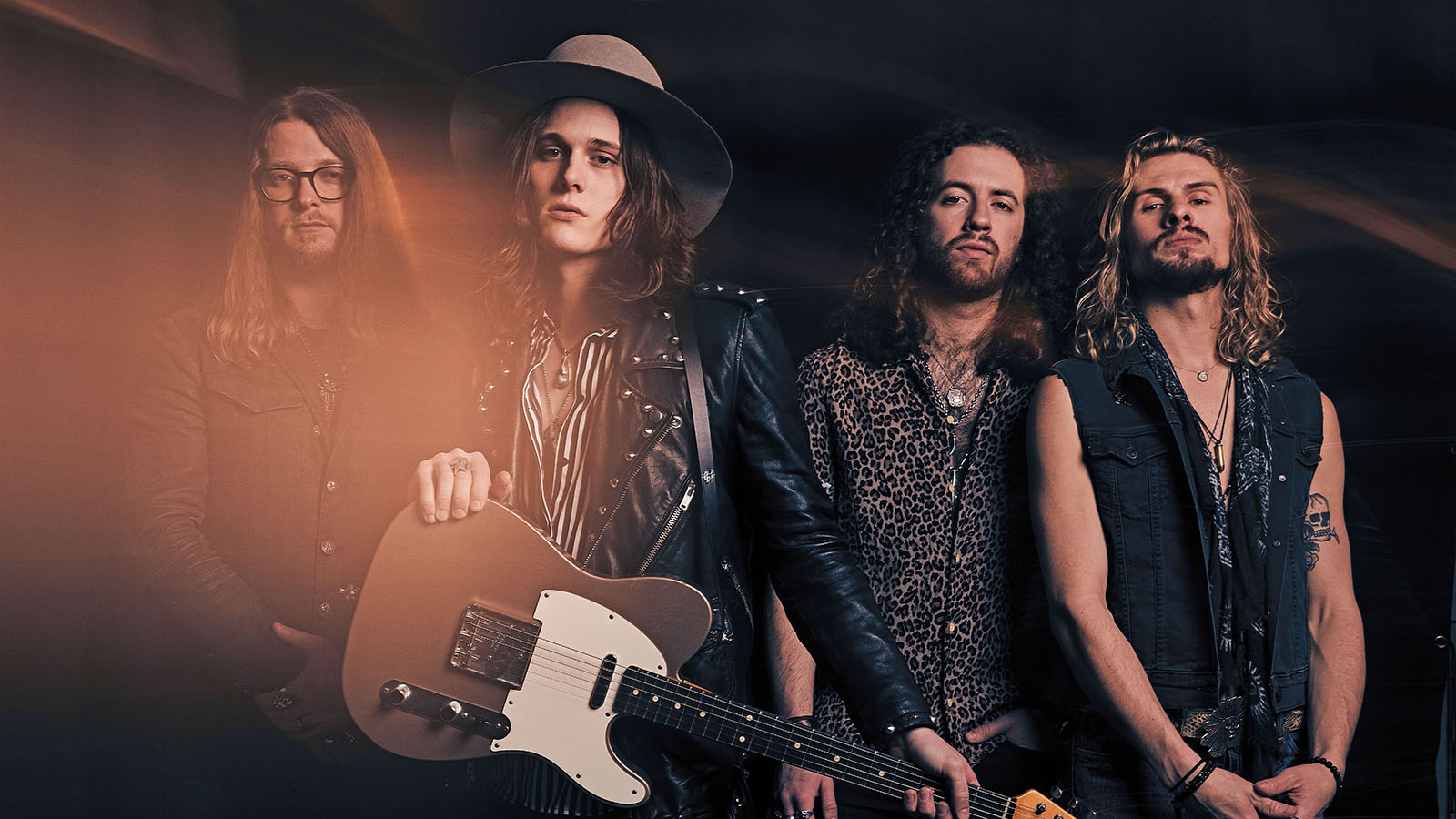
Having supported the likes of AC/DC and Guns N’ Roses across various stadiums around the world, 30 year-old Texan Tyler Bryant now stands as the blues-rock hero for a new generation. But, as he explains, some of his more ambitious ideas were inherited from the late, great EVH himself...
What made EVH’s take on the blues so powerful?
To me, Eddie was one of the most lyrical and melodic players of all-time. He knew when to ‘go’ and when to leave space. I imagine that if Eddie walked into a blues jam, he could undoubtedly get on stage and fit right in. He’d definitely have turned some heads, though!
In many ways, those blues licks were what made his faster guitar lines feel even more mind-blowing...
That’s the thing. Eddie always served the song. He would come up with the most interesting chord voicings, but he also knew when to keep it simple. For me, bluesier stuff is about space and feel. When he would leave space before burning again, it would make the ‘burn’ that much more exciting. Even if it was just for a short breath. He knew how to pick his spots to make for the perfect moment.
Which tracks of yours channelled him the most?
A long time ago, I learned one of his bend and tap tricks and you can hear that on the Shape I’m In solo. You can also hear his influence on the Holdin’ My Breath solo. I was trying to make a melodic solo that built to something. He was the king of that.
And finally, what song would you pick to epitomise Eddie at his most magical?
The slide work on Could This Be Magic? is exactly that, magic. I also love Take Your Whiskey Home. The riff is heavy and the short solo breaks are perfect. He had the vibrato, the slinky bends, and a deep well of licks to pull from. What a legend.
Plini

On his 2016 debut Handmade Cities, Australian prodigy Plini established himself as one of the most tasteful progressive rock players of the modern age – earning praise from far and wide. Last year’s follow-up Impulse Voices took that to new limits, showcasing his technical wizardry in a way that avoided the usual traps of self-indulgence...
What did you first become aware of Eddie Van Halen?
I started listening to him at the start of my journey down the rabbit hole of insane guitar playing, probably around the age of 12. That was only 16 years ago, so I had a good few decades of EVH history to catch up on! But what stood out to me when I first heard his playing, and what still stands out to me, is how he managed to play with all the attitude and charisma of a classic rock ’n’ roll guitarist, combined with the technique and musical vocabulary of an absolute alien.
In what ways did his techniques and tones influence you most?
I love his vibrato a lot, but more and more, Eddie’s biggest influence on me is simply how much enjoyment comes through in his playing... And in his smile. I’m not sure if this is necessarily obvious in my playing, but it’s definitely a lifelong goal. There are very few guitarists I can think of whose playing exudes so much joy and raw excitement, while also being filled with technical and harmonic ideas that are mind-boggling when you try to analyse them. And then you have to factor in his contributions to the world of gear. It’s frankly hard to imagine what sort of guitars we’d be playing or what kind of amp sounds we’d be dialling in if not for him.
So what’s your favourite guitar moment in his extensive discography?
It’s not particularly obscure, but Good Enough is definitely up there. The dialled-back crunchy riff around two-and-a-half minutes in is incredible, even more so when you hear that ballsy tone 15 seconds later. He was too good!
Justin Derrico
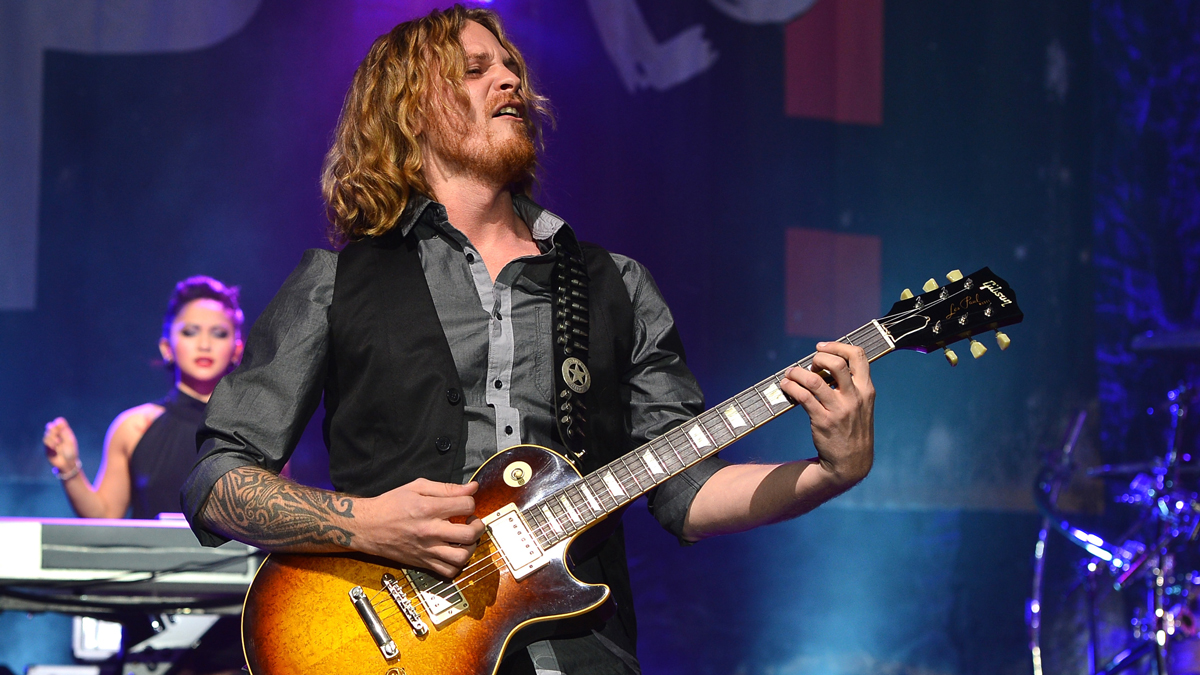
Best known as the axeman for P!nk and house guitarist on The Voice [USA], Justin Derrico has also shared stages with Beyoncé, Tina Turner, and the Pussycat Dolls. He gets his shred chops out for JamTrackCentral, and 2021 will see his long awaited second solo album.
Where did you discover Van Halen?
I used to hang out at this music store where I grew up. There were a few guys locally that really had the Van Halen thing down. They’d come in and start tapping and my mind exploded.
What did you learn from Eddie?
I didn’t get into transcribing and learning like the licks until later, but the vibe of it grabbed me. I really liked the way he’ll bend in to a note and then slide up and bend into the next, and keep going with that. For me more than anything with Eddie, it’s his sheer attitude. It’s just so sassy.
There’s so many dudes that are burning shredders, and they’re great, but Eddie just had this ballsiness to his to his shredding. He was super melodic as well, and he had that gutsy flair where he’d hit a note and it kicks your ass. Then there's a bunch of crazy shit in between, like a sparring match. Even the more melodic stuff still had that gusto.
What else did you like about his playing?
His rhythm playing. His groove is just sick! A friend of mine showed me the isolated guitar track from Hot For Teacher. Even if you listen to it on its own, it’s got a groove to it. He was the greatest.
He was the first person with a high-gain tone straight from an amp, too.
Yeah, and it changed the game really. He was such an innovator in so many respects, his tone for one, his playing, the creation of the Frankenstein guitar, and all his you know crazy acrobatic whammy bar stuff. The guy was just straight-up creative. He was such a great musician that on any instrument he would have done something like that. It was inside of him.
What’s your favourite Van Halen song, then?
It kinda changes, but right now it’s Hot For Teacher. It sounds like someone friggin’ started up a Harley, and then the tapping madness at the beginning. The riff is so badass and the rhythm playing is awesome. It’s the pinnacle of rock ’n’ roll guitar.
Jared James Nichols
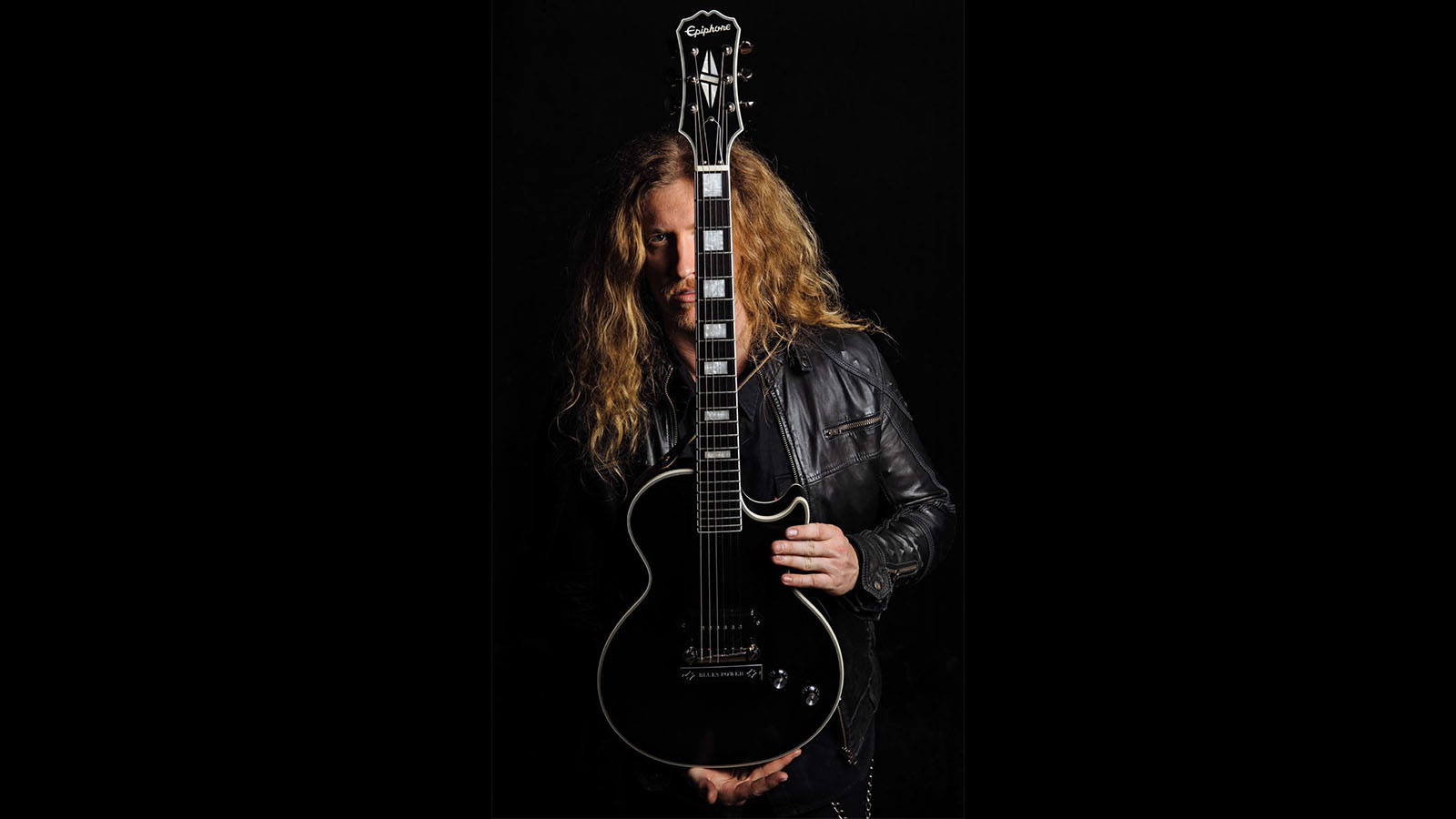
The 32 year-old Wisconsin fingerpicker recently unveiled his Gold Glory Les Paul Custom signature model through Epiphone and was featured on Joe Bonamassa’s Live From Nerdville podcast. It’s easy to see why – his 'blues power' catchphrase, adopted from Albert King, has become the motto he lives his life by...
Guitar legends don’t really come much larger-than-life than Eddie.
Eddie was beyond reality. Beyond limitations of genre, playing style and technique. Eddie embodied the instrument alongside everything he played. He had the ultimate touch, tone, and feel because he understood the deep roots of the blues and emotion in guitar playing. It shined through in him in every note he played.
Eddie and I share similar massive influences, such as Eric Clapton and Leslie West. There are moments in his playing where you can clearly hear him taking such influences and going elsewhere, breathing his own spirit into them.
That Leslie West connection doesn’t get talked about enough!
Yeah! And I think that connection was evident in everything Eddie played, especially on the first Van Halen album. You can hear Leslie’s influence on the tones throughout the record, starting with Runnin’ With The Devil. Also he was using one pickup... He definitely learned that from Leslie. One pickup is all ya need!
As for Clapton, I think that was more foundational for Eddie. Listening to things like Crossroads and Spoonful must have been very big in teaching him the language and vocabulary of blues-based rock ’n’ roll.
Of course he has his bases covered as far as technical ability, using things like fast runs, bends and vibrato, but there was so much more to him as player
When you put it like that, it’s crystal-clear Eddie had this ability to talk through his instrument...
Technically speaking, that’s what it was... Speaking. Of course he has his bases covered as far as technical ability, using things like fast runs, bends and vibrato, but there was so much more to him as player.
There was also something special about his timing, coming down to how he attacked the instrument and where he would place his notes and phrases. All in all, his tone had enough overtones to kill and was always dripping with sweat and soul. It blows my mind to think that he was creating his own musical language less than a decade after Jimi [Hendrix]. What a visionary.
Nili Brosh

Nili Brosh’s CV is a testament to the remarkably talented and versatile guitarist she is. The Israeli-American Berklee graduate has played in The Iron Maidens, Dethklok and Tony MacAlpine’s touring group to name but a few, and she also starred in Cirque Du Soleil’s Michael Jackson ONE residency in Las Vegas.
“I got to play the Beat It solo ten times a week while shooting an arc fire out of my guitar,” she told TG...
What made EVH such a unique and forward-thinking guitarist for his time?
I think it’s a combination of several things. Aside from the obvious innovations to tapping and other techniques we now consider commonplace, I usually like to focus on his lesser-talked about rhythm playing.
Many guitarists find that to be one of the more underrated yet extremely important aspects of his playing, and I agree, for an even more specific reason – he wasn’t just a great improviser on his leads, he was extremely musical and spontaneous in his rhythm playing, very noticeably treating his role like a true accompanist to his various singers.
He had such a clear sense of how to perfectly phrase his riffs, with fills in-between and this ability to do it all on the fly with such unique ideas and unparalleled touch. Throwing in all of those little clutch moments that are hidden in every riff, always doing something a bit different on every repeat, and always so effortlessly. That to me is the real Van Halen swagger.
In what areas do you think he influenced your playing the most?
Strangely enough, I think for me it’s his blues licks. It might be considered kind of cliché when talking about Van Halen, but just like everything else he did, he did it in his way. When I went and dug into that aspect of his playing deeper, a direct connection to how he influenced the lines of his successors suddenly appeared.
All of a sudden it became so clear as to what the generation of great players that came right after him took from him... And how. I will also say that studying his music really helped my ‘transcription ears’ get to a new level in the art of guitar. Many solos I’ve since transcribed – like Nuno Bettencourt’s, for example – all of a sudden seemed much easier to figure out and comprehend.
If anything, he brought back guitar hero-ness to the masses
Finally, what is your favourite EVH track and why?
There’s so much classic Van Halen in Hot For Teacher. I’m a sucker for his swing and time feel, and in a way I like that this is the song that everybody knows. There’s quite a bit of legendary playing – both lead and rhythm – while still being super-accessible and easily loved by many.
If anything, he brought back guitar hero-ness to the masses, and this is such a great example of that. Additionally, any song that sounds like there’s a huge party going on and everyone’s having fun is classic VH to me, so I can’t ignore that either! It’s also extremely fun to play.
Sophie Lloyd

With 576,000 YouTube subscribers and 387,000 Instagram followers, Sophie Lloyd is the UK’s best-known new shredder. Videos of her original compositions have racked up 20 million views and her covers millions more. In 2020, Kiesel released a Sophie Lloyd signature model.
How did you get into Van Halen?
My dad would drop me to school some days and have it blasting in the car. I was playing acoustic, and that was when I really made the switch. I was like, ‘I gotta get an electric guitar!’ Then my guitar teacher at university, Jim Clark, was the biggest EVH fan in the world. Every lesson he was like, ‘Here’s a Van Halen lick’...
One of your first popular videos was your cover of Panama.
Yeah, that was really fun to play, but challenging as well. The harmonic stuff he does was new to me when I started learning that, so that was a really big turn in my playing. The timing – it’s a split-second thing but it takes a couple weeks to really nail it.
You also did a cover of Billie Eilish in the style of Van Halen...
It sprung from Billie Eilish saying she hadn’t heard of Van Halen. I was like, ‘What if she had?’ I like Billie Eilish and all the new stuff, so it was fun for me to be able to combine that song with all the crazy Van Halen techniques. I think it sounded pretty good!
Are the chords in that video inspired by Unchained?
Yeah, those triads! Eddie often used them alone but I love layering it over power chords. It adds such a cool effect, especially when you’re playing a pedal on the A string. It’s really driving and it makes you want to get up and dance.
What aspects of Eddie’s playing inspired you the most?
I attempted to learn Eruption when I was 11. Now the majority of my solos have a tapping lick in them. I think a big part of is the emotional side. You can’t listen to a Van Halen solo and not smile. Sometimes they’re crazy and they’re silly, and it’s awesome! I want people to listen to my solos and smile as much as I do when I listen to Van Halen solos.
What’s your favourite Van Halen song?
Probably Ain’t Talkin’ ’Bout Love. That just gets me hyped whenever I hear it.
Hannah Staphnill (Hawxx)
Hawxx are among the fastest-rising new metal acts. Their international line-up boasts members from the UK, Greece, and Bahrain. 2020 saw them winning the PRS Women Make Music Award, releasing the EP Deadlands, and performing at the Heavy Music Awards.
How did you get into Van Halen?
Van Halen is one of those forces that’s just always been there. I got really into the '80s Bay Area thrash scene, so I was reading all these interviews with people like [Testament’s] Alex Skolnick, and they all referenced Van Halen. I was like ‘OK, I need to go back and investigate.’
What did you discover?
My first instrument was piano so I grew up with Bach, Mozart, and Schubert. A lot of Eddie’s tapping has maybe a harmonic minor edge that’s classically influenced. I never got into learning solos; I didn’t have the patience for it. I mainly listened for techniques and watched live clips, analyzing what is actually possible on the guitar. If there was something I didn’t understand, I’d work that bit out. It’s kind of born out of laziness but it’s a good upshot if it’s helped develop my own thing!
There’s a lot of Van Halen-ish whammy stuff in Hawxx.
I love whammy to the point where I might be overusing it, but no-one’s complained yet! Van Halen does all this intricate guitar and then it’ll just be a kind of wail. I like the contrast. I like screaming and wailing and that kind of chaos, and the whammy does that for me. I think it feels more sort of emotionally connected as well.
When Eddie does it you really feel it. He’s obviously showy, but it’s not at the detriment of melody. I think melody’s king, and the melody going through his playing is really strong.
Mark Holcomb
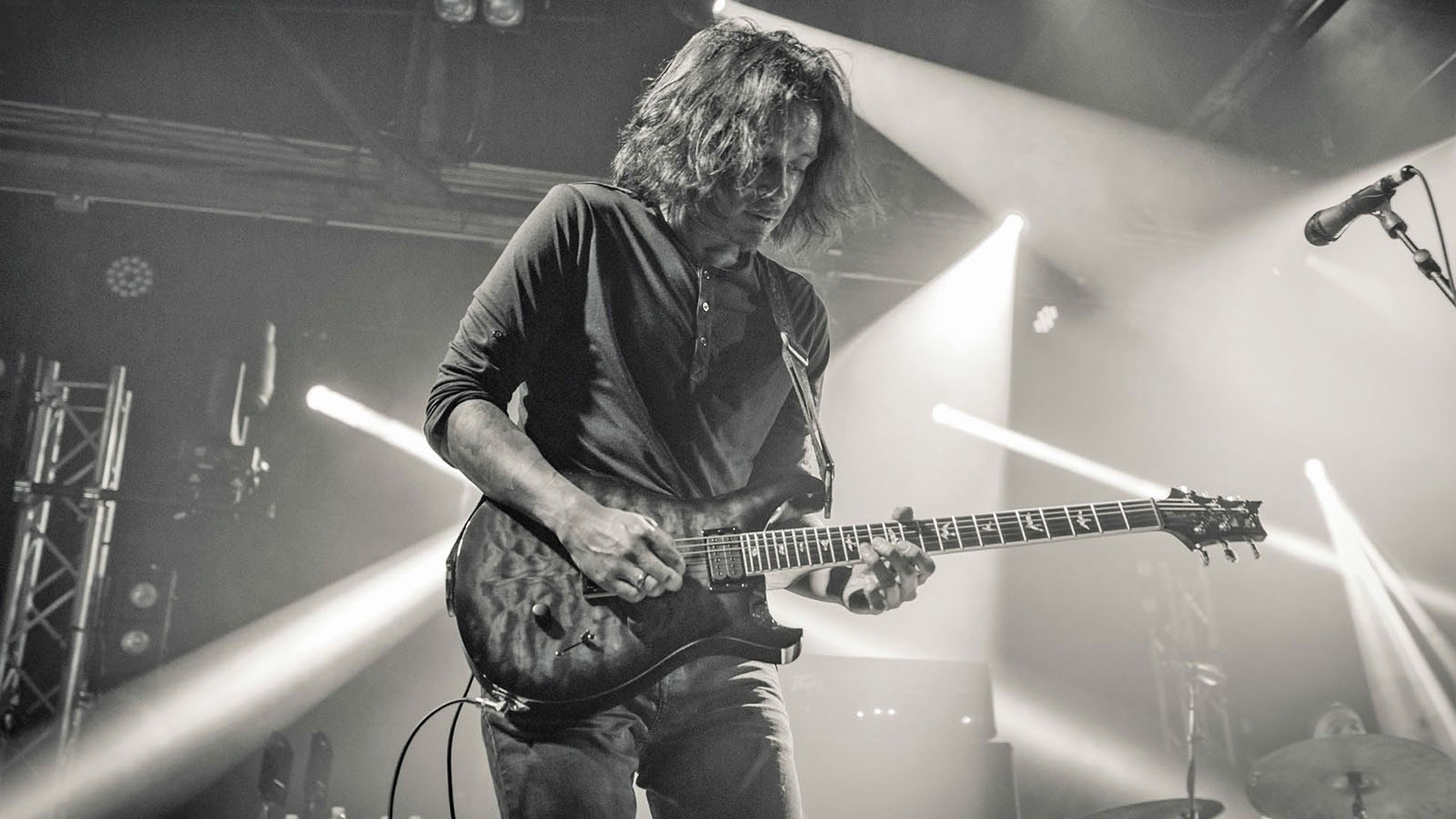
Since Mark Holcomb joined Periphery in 2011, the band have released six albums, defining the djent genre and earning a Grammy nomination. PRS released his signature guitar in 2016, with Seymour Duncan producing his Alpha/Omega pickups the following year. Mark is currently recording a new Periphery album.
What were your favourite aspects of Eddie Van Halen’s playing?
Even before I grasped his technical prowess I remember latching onto the sound of his guitar. It’s like the first time you hear Freddie Mercury’s voice. It sounded as clear as an acoustic guitar but it had this edge to it. When he was laying into it, it sounds metal. If you pick hard it’s angry, but if you lay back, roll the volume down, you can sound like you’re playing through a clean channel. Just by how you play, you can sound like a different player, and let the attitude shine through.
When I first picked up guitar I went back to the first Van Halen album. I became obsessed with learning some of those tricks
How has that sound influenced Periphery?
He pioneered an entire style of guitar tone. Without him it’s hard to imagine where even good metal tone was. Look at Periphery, or 90 per cent of modern metal bands – without a 5150, what would metal sound like? The genre probably wouldn’t exist in its current form without Eddie.
What techniques did you learn from him?
When I first picked up guitar I went back to the first Van Halen album. I became obsessed with learning some of those tricks. Everything was fluid, unpredictable, and off -the-cuff sounding. That level of virtuosity always felt otherworldly to me. And the fact he would pair it with these insanely well-written songs that even my mom knew, it was crazy. They had all these chart-topping songs but he was also the best guitar player in the world. It’s such a weird pairing, especially compared to 2021.
Amit has been writing for titles like Total Guitar, MusicRadar and Guitar World for over a decade and counts Richie Kotzen, Guthrie Govan and Jeff Beck among his primary influences as a guitar player. He's worked for magazines like Kerrang!, Metal Hammer, Classic Rock, Prog, Record Collector, Planet Rock, Rhythm and Bass Player, as well as newspapers like Metro and The Independent, interviewing everyone from Ozzy Osbourne and Lemmy to Slash and Jimmy Page, and once even traded solos with a member of Slayer on a track released internationally. As a session guitarist, he's played alongside members of Judas Priest and Uriah Heep in London ensemble Metalworks, as well as handled lead guitars for legends like Glen Matlock (Sex Pistols, The Faces) and Stu Hamm (Steve Vai, Joe Satriani, G3).
“His songs are timeless, you can’t tell if they were written in the 1400s or now”: Michael Hurley, guitarist and singer/songwriter known as the ‘Godfather of freak folk,’ dies at 83
“The future is pretty bright”: Norman's Rare Guitars has unearthed another future blues great – and the 15-year-old guitar star has already jammed with Michael Lemmo










